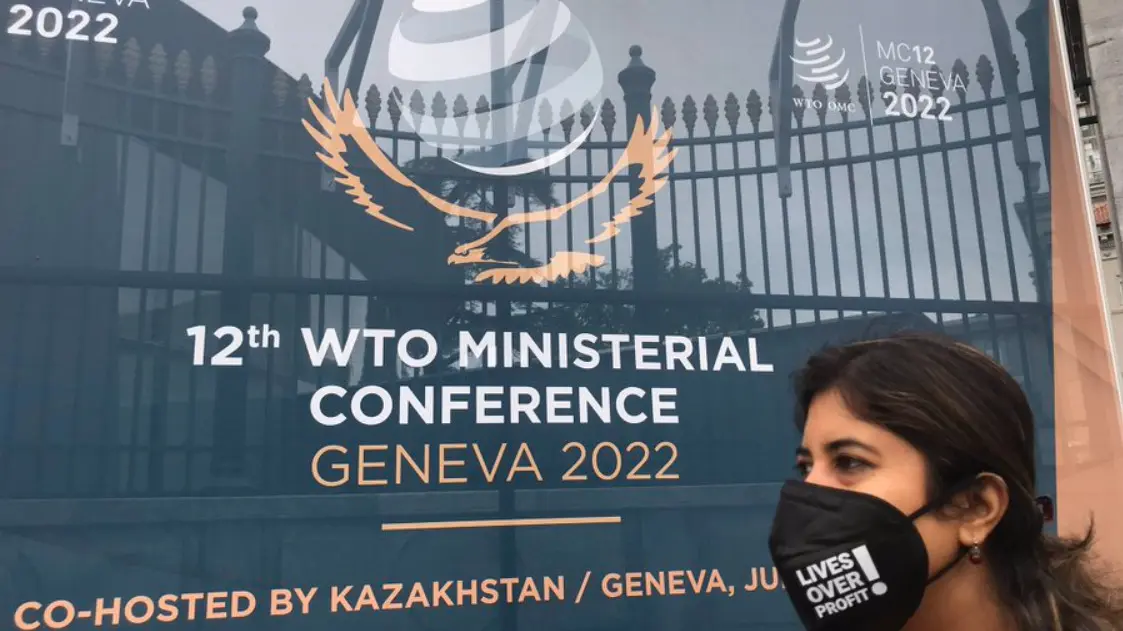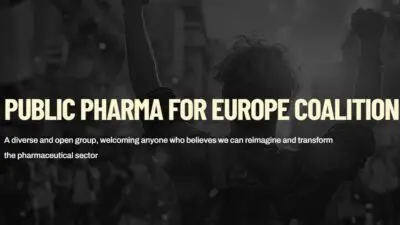World Trade Organization and Pandemic response: Time is up
At the 12th Ministerial Conference of the WTO taking place from 12-16 June, trade delegates are likely to pass a meaningless Covid-19 decision in an attempt to safeguard the organization’s face after months of botched negotiations for a suspension of harmful trade rules on intellectual property.
More than two years into the pandemic, and 20 months after the TRIPS Waiver proposal was formally brought to the World Trade Organization (WTO), trade delegates are meeting at the 12th Ministerial Conference of the WTO in Geneva from June 12-16. But time has failed us. Uncountable lives have been lost unnecessarily due to the failure of the WTO to deliver an outcome when it was most required.
In a recent press conference Nobel Prize-winning economist Joseph Stiglitz stated that Pharma companies did not want a quick response. “The slower the response, the higher their profits.” This was their game all along. After playing the delay game for more than a year and a half, the European Commission and a handful of rich countries put pressure on the WTO Director General (DG) Ngozi Okonjo-Iweala to make an alternative proposal in May 2022.
The TRIPS waiver is a proposal to lift Intellectual Property (IP) prerogatives on Covid-19 vaccines, tests and medicines. It was brought to the WTO table in October 2020 by India and South Africa. Ever since, negotiations surrounding the proposal were marked by extreme amounts of pressure exercised by high-income countries, who have worked relentlessly for the waiver to be sidelined.
The DG’s proposal – Decision on WTO and Covid-19 – draws heavily on a text which had been leaked a couple of months earlier and presented as the outcome of negotiations held among a small group of states, namely the European Union, the United States, India and South Africa. It emerged later that it had been prepared by the WTO secretariat and that it did not have backing from any member of the quadrilateral group except the EU. As the pressure on DG Ngozi continued, she had to share it with the wider membership as her own. Trade unions, academics and civil society alike have strongly criticized this text, calling it completely inadequate.
Saving the face of the WTO
Over 6 million people have died due to Covid-19. A meaningful TRIPS waiver could have prevented many of these deaths. Experts argue that the DG’s proposed Decision is not designed to make a difference in improving the availability of health products that can curb the trajectory of the pandemic. Instead of saving lives, the DG’s text is rather intended to provide an opportunity to save the face of the WTO – with an empty deal that can be claimed as a successful outcome of protracted negotiations.
Ngozi’s Decision on WTO and Covid-19 differs from the TRIPS waiver proposal in many ways. The TRIPS waiver aims to enable more equitable access to all Covid-19 medical products especially in the Global South. The DG’s proposed Decision, on the other hand, is focused on vaccines. While the text does include the possibility of expanding application to tests and medicines, it provides a window of only six months to do so – without any guarantee this will actually happen.
The document also has clear flaws where ambition and coverage are concerned. Instead of introducing new, easily navigable mechanisms for governments to rely upon, the DG’s Decision limits itself to clarifying existing caveats to trade rules that enable governments to sidestep patents, also called compulsory licensing. Finally, the DG’s Decision on WTO and Covid-19 does not take into account different kinds of IP privileges which influence the many stages of the process of bringing a product to the public. For example, this would include data collected through clinical trials, which is needed for regulatory authorities to assess the safety of a vaccine, and pharma companies claim are protected by trade secrets.
Instead, DG Ngozi’s proposal only considers the lifting of patents, and that only in the case if the vaccines are deemed necessary to address the pandemic. The last is not the only new roadblock that high-income countries at the WTO have tried to introduce in the proposed Decision. The United Kingdom and Switzerland, for example, used the latest phase of the negotiations process to push for limitations for the existing caveats provided under the TRIPS agreement, as well as confusing language which would discourage low and middle-income countries from implementing the Decision.
Too little, too late
Commenting on the content of the WTO document, Rosa Pavanelli, General Secretary of Public Services International, said: “The text put forward by DG Ngozi at the WTO does not bring any real solutions, it is worse than having no deal at all. The fact that we had to wait this long to have such a bad outcome shows that the mechanisms of our international trade governance system are inadequate to address this kind of challenge. The WTO was the wrong institution for this discussion all along. What we need,instead, is a permanent mechanism that would automatically trigger the suspension of harmful trade rules when a public health emergency of international concern that could become a pandemic is announced in the future.”
Roman Vega, Global Coordinator of the People’s Health Movement, commented: “Ever since the beginning of the pandemic, the Global South has been suffering because of the vast disparity in access to vaccines, diagnostics and therapeutics. The DG’s proposed Decision on WTO and Covid-19 fails to address this. This organization has clearly proved that it is not the right institution to take decisions related to global health policy. It is imperative to return these discussions to legitimate forums, and to confront the multi-stakeholderism capture and private interest interference of international organizations.”
As delegates take their seats in Geneva, the original TRIPS waiver remains an option, yet one extremely unlikely to pass. Since rich countries continue to dismiss it and the sense of urgency around the pandemic seems to be winding down, the moral pressure for the waiver has also diminished.
A strong campaign
Yet, while the original proposal is unlikely to be adopted, health and trade justice activists have been able to build a strong campaign since it was first brought to the WTO. For one, the broader public better understands that trade rules pose a barrier to equity in health and the importance of putting people over profit in health. The campaigns over the last two years have also evidenced how IP privileges get in the way of government response to an emergency, and provide a lesson for other emergencies, such as the climate emergency. In the months to come, pressure will have to be maintained to keep the demand for the suspension of trade rules that protect profits at the cost of people’s rights and lives beyond the WTO and into legitimate forums.
This article was written by Susana Barria (Public Services International) and Ana Vračar (People’s Health Movement) formerly published on People’s Dispatch.


